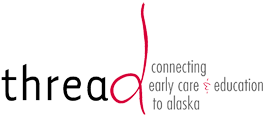Pre-K in a Mixed Delivery System
Research has shown the critical importance of high-quality early childhood experiences for all children and its positive impact over the child’s lifetime. For parents of three- and four-year olds desiring a high-quality early education experience, Pre-Kindergarten (Pre-K) can provide a bridge between preschool and Kindergarten.
Definitions
Types of Care
Child Care Provider – An organization or individual that provides early care and education services.
Licensed Child Care Providers/Facilities/Program – Licensed child care providers/facilities/program are those facilities that possess a current license, issued by the Department of Health & Social Services or the Municipality of Anchorage, to operate a child care facility in the State of Alaska.
Pre-Kindergarten (Pre-K) – In-home or center-based child care, Head Start, private preschool, and school district preschool programs serving 3-5 year old children.
Head Start and Early Head Start – A federal program that provides comprehensive early childhood education, health, nutrition, and parent involvement services to low-income families. The program is designed to foster stable family relationships, enhance children’s physical and emotional well-being, and support children’s cognitive skills so they are ready to succeed in school. Early Head Start works with children birth to three years of age and their families. Head Start works with children three to five years of age and their families. Federal grants are awarded to local public or private agencies, referred to as “grantees,” that provide Head Start services. Currently the State of Alaska provides some grant funds to Early Head Start and Head Start grantees. Head Start is administered by the Administration for Children and Families (ACF) of the U.S. Department of Health and Human Services (HHS).
Preschool – Programs that provide early education and care to children in the two or three years before they enter kindergarten, typically from ages 2.5-5 years. Preschools may be publicly or privately operated and may receive public fund.
Mixed Delivery
Mixed-Delivery System – Programs, providers and settings (such as Head Start, licensed family and center-based child care programs, public schools and community-based organizations) that are supported with a combination of public funds and private funds.
Industry Terms for Reference
Early Childhood Care and Education – Programs and services focused on development of children’s social, emotional, cognitive, and physical functions that aim to build a foundation for lifelong learning and well-being. These programs operate in a complex interchange of health, social, child care, and education services that provide a holistic system of support for children and their families.
Quality Early Childhood Care and Education – As defined by the JTF, a program that is licensed, certified, or approved and in good standing with their oversight agency. Such programs include, but are not limited to, Early Head Starts and Head Starts, State of Alaska or Municipality of Anchor-age- licensed child care, public pre-elementary programs, tribally-approved child care, and child care approved by the military.
High-Quality Early Childhood Care And Education – Defined by the JTF, a program that has a Continuous Quality Improvement Plan (CQIP), not in response to non-compliance or enforcement, to which the program is held accountable.


